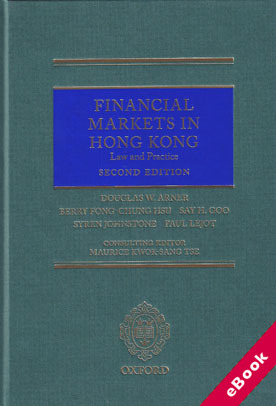
The device(s) you use to access the eBook content must be authorized with an Adobe ID before you download the product otherwise it will fail to register correctly.
For further information see https://www.wildy.com/ebook-formats
Once the order is confirmed an automated e-mail will be sent to you to allow you to download the eBook.
All eBooks are supplied firm sale and cannot be returned. If you believe there is a fault with your eBook then contact us on ebooks@wildy.com and we will help in resolving the issue. This does not affect your statutory rights.
Since the publication of the first edition in 2006, financial regulation around the world has changed dramatically as a result of the 2008 global financial crisis.
As one of the world's leading financial centres, international regulatory reforms have had a significant impact on the legal and regulatory system in Hong Kong. This new second edition provides a comprehensive and authoritative single-volume guide to the main areas of financial regulation and financial law in Hong Kong.
Given the massive changes in financial regulation globally and in Hong Kong, the second edition has been substantially rewritten and revised to address changes in markets and their legal and regulatory frameworks, as well as the implications of these changes to future market development.
The book is in five parts: The first part considers the evolution of Hong Kong's role as a financial centre and the development of its financial regulatory structure, one that is perhaps unusually complex given the size of the jurisdiction.
The second part discusses the regulation of the banking, securities, insurance sectors, including the regulatory powers of the Hong Kong Monetary Authority (HKMA), the Securities and Futures Commission of Hong Kong (SFC), the Office of the Commissioner of Insurance (OCI), and the forthcoming Independent Insurance Authority (IIA). The third part covers regulation of financial products and services, including securities offerings and listings, investment products and asset management, financial derivatives, and takeovers and mergers.
The fourth part addresses market conduct and misconduct, including corporate governance, market abuse and financial crime. Finally, the fifth part examines the international context, focusing on the relationship between Hong Kong's financial markets and regulation and mainland China as well as key issues for Hong Kong's role as a major global financial centre.